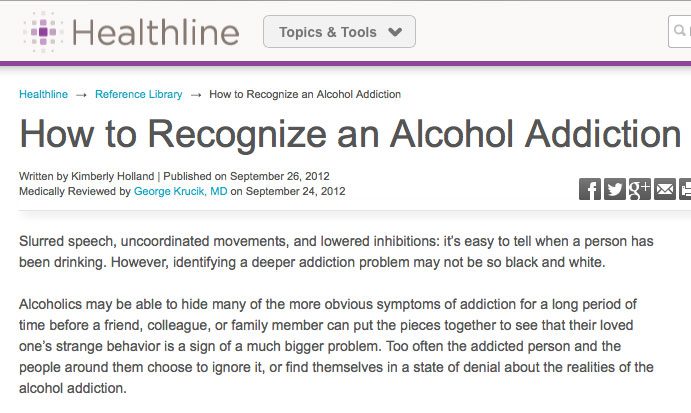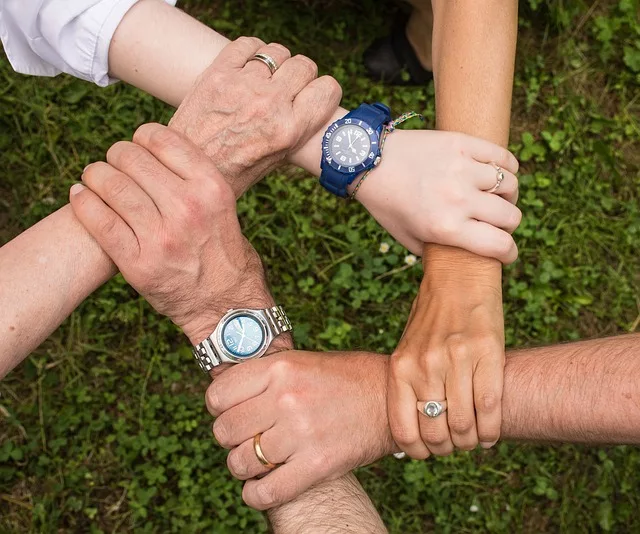Over half of U.S. adults drink regularly, and alcoholism affects nearly 1 in 13 adults in the United States. This makes it one of the most pervasive diseases in the country and one of the more difficult to overcome.
When dealing with a friend or loved one who might be an alcoholic, it’s often difficult to know how to help them. Here are 10 ways to help an alcoholic overcome their disease.
1. Identify The Problem
Alcoholism is a disease that can be difficult to pinpoint. Many alcoholics appear to be fully functional the majority of the time. To identify the problem, look for signs like:
- Drinking during the workday
- Always ordering alcohol at restaurants
- Frequently late to work or social engagements
- Periodic Blackouts
- Violence during or after drinking
Although these are only a few of the symptoms, the following websites offer more in-depth signs, symptoms, and help for people that may have drinking problems:
Here’s an example of what these sites have to offer:

For anyone who is uncertain about identifying the signs of alcohol addiction, don’t be afraid to reach out to a professional for assistance. The addiction community is made up of caring and compassionate professionals who are trained to help.
Simply pick up the phone and call. Many anonymous helplines are available to answer questions without giving out personal information.
2. Confront the Problem of Alcoholism
Alcoholism thrives primarily because those who suffer from it are in denial and don’t readily admit they are alcoholics.
Once the problem has been identified, it’s imperative to confront it directly.
Subtle hints aren’t good enough. Force the alcoholic to face the problem head-on.
Why is this so important? Take a look at these statistics on Alcohol Use Disorder:

For truly difficult cases, an intervention may be required to firmly convince the alcoholic that they have a problem.
3. Be Open About Alcohol Addiction
One of the main reasons that alcohol addiction is so difficult to fight is that many people unintentionally enable alcoholics.
What are two ways to help?
- Make friends aware of the problem.
- Make the family aware of the problem.
The conversations begin with awareness. By ignoring the issue, alcoholics are more likely to continue to engage in bad habits and continue the cycle of alcoholism.
4. Seek Professional Assistance
Use a treatment locator like SAMHSA.GOV to find treatment centers that suit your needs.
The SAMHSA Treatment Locator offers the option to search for treatment centers nearby, or if you prefer to travel for treatment, you can search by state or name.

A qualified addiction treatment center can offer treatments with high success rates compared to tackling the problem without professional assistance.
If an alcoholic won’t enroll in such a program or is resisting treatment options, it may be necessary to seek the help of an interventionist.
5. Identify and Remove Alcohol Triggers
Most alcoholics drink in response to triggers, like work stress or social stress. Identifying any triggers and trying to remove or minimize them is important. This may also require the alcoholic to make serious life changes, such as changing jobs or not associating with friends who might be a negative influence.
Psych Central gives 5 excellent tips on how to manage and remove triggers:

- Identify – For everyone, this is different so pay attention to your surroundings
- Know What You’re Working With – Know your triggers well and stay alert
- Practice – Rehearse what you will do when you are triggered
- Take Care of Yourself – When you are healthy (eating right, sleeping, etc.) you can handle triggers more effectively
- Don’t Test Yourself – stick to what’s working
6. Remove Temptations of Alcohol
It’s not possible to completely remove alcohol from an alcoholic’s life. But it is possible to take steps to remove temptations. These steps are especially important in the beginning and the months following treatment:
- Remove all alcohol from the home of the alcoholic
- Encourage mutual friends and family members to do the same
- When going out, avoid places that serve alcohol
Following these three steps can help avoid the chances of a relapse.
7. Create a Positive Support Structure
An alcoholic needs to know that they have family and friends that will provide support.
Set up a complete support system for the alcoholic, and make sure everyone is in contact with each other and that someone is always available, no matter the hour or day.
A reputable inpatient treatment facility ensures this support is always available, but it’s also important to be aware of the different support groups available in the area.
Support Groups such as Smart Recovery or Alcoholics Anonymous (AA) always have regular meetings open to anyone in need.
8. Support the Support Structure
This one may seem odd, but the alcoholic isn’t the only one who needs help. Providing support for an alcoholic is difficult and can be a struggle both physically and emotionally. If friends or family members in the support group are having difficulty dealing with alcoholism, make sure they receive help coping or time off if they need a break. It’s easy to become overwhelmed, so make sure there are people to turn to for help. Friends and families of problem drinkers can find support at local Al-Anon meetings, which are available nationwide. It’s also important to keep track of meeting dates and times, appointments with counselors and physicians, and other necessary support items. Put everything down on paper or use a calendar to schedule things and set reminders.
9. Engage in New Activities
Explore the world and find new shared hobbies. Break old habits and try new things that keep the mind off the old ways of doing things. By staying focused and engaged in healthy activities, it strengthens the chance of success and decreases the possibility of a relapse. WebMD offers a few good suggestions in the Good Life Activities For Your Family article.10. Don’t be Negative About Setbacks
Despite all of your actions, setbacks, and relapses may happen. The worst thing to do is offer guilt, anger, or scorn for these setbacks. Instead, encourage, and learn from the setbacks, but don’t dwell on them. This is easier said than done, but if you need more support, check out the article About Health, Dealing With Having a Relapse. Print out this list, expand upon it, and stick to it.
Related:
6 Ways For Non-Drinkers To Stay Sober by Not Drinking
Choosing Between Inpatient and Outpatient Addiction Treatment
Why Relapse Isn’t Failure
6 Tips for Overcoming Addiction Triggers and Cravings
7 Things You Might Not Know About Delirium Tremens
Print out this list, expand upon it, and stick to it.
Related:
6 Ways For Non-Drinkers To Stay Sober by Not Drinking
Choosing Between Inpatient and Outpatient Addiction Treatment
Why Relapse Isn’t Failure
6 Tips for Overcoming Addiction Triggers and Cravings
7 Things You Might Not Know About Delirium Tremens 




